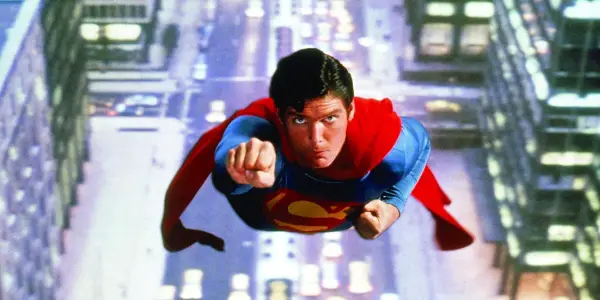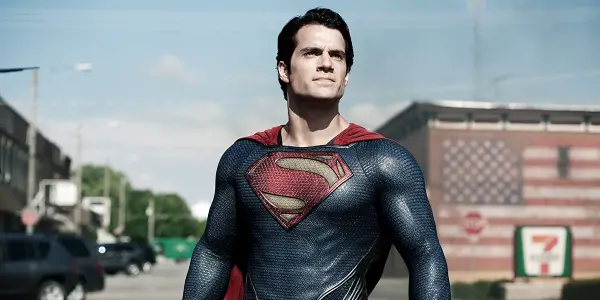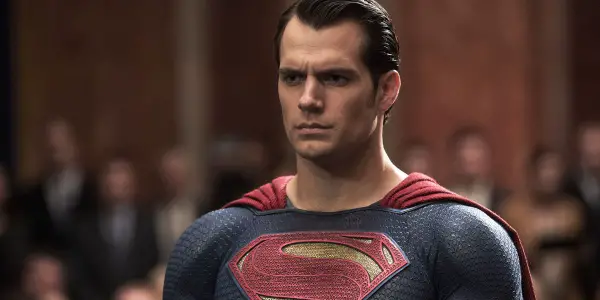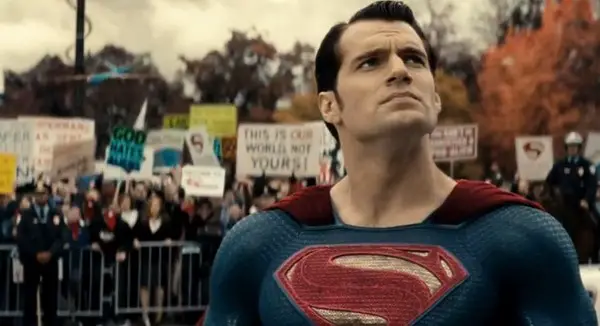The Anxiety of Choice: Becoming Superman in Snyder’s DCEU

I am a husband, father, and teacher in the upstate…
Superman is one of the most difficult characters to write in any given medium. When treated superficially, he is an all-American boy scout who fights for the American values we have never quite achieved. In one of his most famous film iterations, Superman (1978), he represents an ideal of traditional American rural virtues and optimism in the midst of the jaded and cynical 1970s. Christopher Reeves‘s Superman, like the MCU’s current version of Captain America, was a man out of time and he provided a symbol for what we aspire to be when we are at our best. For many, this was the version of Superman that they hoped to see in Zack Snyder‘s Man of Steel (2013).
When the first trailers dropped for the film, audiences saw an image of a child standing with a red blanket tied around his neck against a blue and grey palette, looking up as if he were about to fly. Russell Crowe as Jor-El delivers a speech about what he wants his son to become: “You will give the people of Earth an ideal to strive towards. They will race behind you, they will stumble, they will fall. But in time, they will join you in the sun, Kal. In time, you will help them accomplish wonders.” The teaser ends with Superman flying straight up into the sky like a jet. Audiences went into the film expecting the type of wonder and aspiration that the 1978 Superman film delivered. Instead, they were given a philosophical reflection on choice, ethics, and what it means to be human.
Snyder and the Difficulties of Transitioning from Paper to Celluloid
The difficulty that Zack Snyder and Warner Bros. have faced in creating an interconnected DC universe, to compete with Marvel’s own cinematic universe, is one of adaptation. Each generation of comic book readers meets a different version of Superman. Each version of Superman has been altered by the various writers who have contributed to the character’s history as well as how the character reflects the decade in which he is written. Layered on top of that are the many film and TV adaptations of the character that have also molded how various generations view the character and what various generations expect from the character.
Evolution and change are a part of the process of these characters being in a serial medium that stretches back to 1938 with the introduction of Superman. If a contemporary reader were to pick up Action Comics #1 and the comics that followed during Jerry Seigel and Joe Shuster’s run, they would be surprised to find a hero that does not fly and who is not as concerned about the American way as he is about standing up to various types of bullies: corrupt politicians, weapons manufacturers, abusive husbands, gangsters, and slumlords.
In comic books, if a writer wants to explore a philosophical idea with the character of Superman, or any of the other characters, and it doesn’t necessarily congeal with the current serial nature of the narrative, the writer can be given the liberty to create an Elsewhere book, which is not in the continuity of the main book or timeline, or the writer can produce a mini-series that is separate or loosely connected from the main continuity.

Through Elsewhere series and miniseries, creators are able to play with iconic characters and explore ideas without upsetting fans who have certain notions about what characters should be. Filmmakers, however, do not usually have this liberty. When studios adapt iconic comic book characters to the screen, they are usually trying to serve the lowest common denominator. Their attempts are to try to balance serving comic book fans what they want, while also appealing to casual viewers who are mainly just familiar with the character through previous films or the character’s presence in the culture. Too much money is at stake to let a creator play with a character in a way that might diverge from the most popular ways that character has been represented in film, yet Warner Bros. gave Zack Snyder the liberty to present Superman in a different light. Snyder’s iteration of Superman is an interesting development in the character because he is not inherently good and he is not inherently Superman. He becomes Superman through a series of choices.
Existentialism and Man of Steel
Snyder’s Superman is an interesting development in the character because it imagines Superman without an essence. Instead, Superman must decide to become what we expect him to be and those decisions are filled with anxiety and ambiguity because the decisions are complex and the telos of those decisions are not final. Superman in the Snyder films is essentially a representation of existential philosophy as described by Jean-Paul Sartre. In his essay, “The Humanism of Existentialism,” Sartre explains, “What is meant here by saying existence precedes essence? It means that, first of all, man exists, turns up, appears on the scene, and, only afterward, defines himself. If man, as the existentialist conceived him, is indefinable, it is because at first, he is nothing. Only afterward will he be something, and he himself will have made what he will be. Thus there is no human nature since there is no God to conceive it” (Essay in Existentialism 35-36).
Sartre asserts that human liberty is born out of the nothingness that is only known through existing. Humans may face cultural, religious, and societal pressures to act and live in a certain way, but the individual chooses to comply with these expectations or to break from them. Through decisions, the person becomes who he or she is because there is nothing essential to that person’s being except for being something instead of nothing.
Snyder introduces this idea of Superman’s liberty to choose and alienates Superman from his planet of origin and from Earth from the beginning of Man of Steel. Krypton, in the film, is collapsing on all levels at the beginning of the film, and the audience later learns from Jor-El that the planet’s government had attempted to eliminate liberty from the conception of Kryptonians. Jor-El and Lara reject the premise of their society and assert an act of freedom: they have a child naturally. Jor-El explains, “Every child was designed to perform a predetermined role in our society as a worker, a warrior, a leader, and so on. Your mother and I believed Krypton lost something precious, the element of choice, of chance. What if a child dreamed of becoming something other than what society had intended? What if a child aspired to something greater? You were the embodiment of that belief Kal. Krypton’s first natural birth in centuries.”

Clark is then sent to an alien planet alone and free from the responsibilities of being a Kryptonian until he meets Zod at the midpoint of the film. In Kansas, where Superman is adopted by Martha and Jonathan Kent, he is also alienated because he is not like the other children of Earth. His origin is a mystery to him, he has special abilities that his parents encourage him to keep hidden because they fear he will be taken from them, and then they leave what he chooses to do with his ability up to him. In a flashback, when Clark is bullied and shoved down by a group of kids and does not react, Jonathan says, “You just have to decide what kind of a man you want to grow up to be, Clark; because whoever that man is, good character or bad, he’s… He’s going to change the world.” Clark from his youth to his adulthood is left with this choice, and since he is invisible to man-made weapons, he is literally free to exist in the world in any way that he chooses.
The Ethics and Existentialism and the Anxiety of Superman
The existential liberty that is established at the beginning of the film also establishes the existential ethics of the film. Without a God or lawgiver in the atheist strain of existentialism, humans become the ones who establish ethical behavior. Sartre explains, “To choose to be this or that is to affirm at the same time the value of what we choose because we can never choose evil. We always choose the good, and nothing can be good for us without being good for all” (“The Humanism of Existentialism” 37). Once one realizes the weight of making decisions within this philosophical system, one can become consumed with anxiety because one’s choices establish a universal standard for all.
The anxiety that Clark faces is doubled because his abilities make him essentially a god to the humans of Earth. Clark’s choices do not just set an ethical standard (according to Sartre, each individual’s choices establish an ethical standard) but also his choices have the power to completely change and reorder the world. Clark, as he tries to remain hidden, cannot help but save lives because most would agree that if you have the power to save lives and you can save lives then you should choose to save lives. The larger choice that Clark must make is whether he is going to align himself with earth and its people, or if he is going to choose to remain an outsider who occasionally helps when placed in a position to help by chance.
Clark’s choice is brought to a head when General Zod forces Superman into the light by threatening the planet. Before Clark turns himself into Zod in an attempt to save Earth, he talks to a priest in Smallville and describes his conflict: “Zod can’t be trusted. The problem is, I’m not sure the people of Earth can be either.” Clark doesn’t trust either side to act in a way that is good for all. Clark, in his decision-making process, attempts to choose in a way that would be ethical and would benefit both the people of earth and the few Kryptonians that are left from the planet’s destruction. To earn Earth’s trust and to show that he intends to do good, he turns himself into the U.S. military and then willingly allows the military to turn him over to Zod.
Zod presents Superman with another ethical choice. He can rejoin Krypton or he can make himself an enemy of the last representatives of Krypton’s government. When Superman realizes that joining Zod means participating in genocide against humanity, Superman aligns himself with humanity and takes his first giant step toward becoming both human and Superman as the audience imagines him being. With each decision, he establishes an ethical standard and he becomes Superman rather than just inherently being Superman.

This version of Superman stands in stark contrast to Superman in the 1978 film, which shows Superman coming to terms with his identity long before he appears on the world stage dressed in red and blue. Furthermore, Snyder’s version of Superman struggles with every choice and even doubts the choices he has made once the consequences are revealed. Snyder’s Superman lives in a more complicated world where each decision is a life or death decision and not all lives can be saved in the particular circumstance in which he finds himself.
The Shocking Conclusion of Man of Steel
Many fans did not like the last hour of Man of Steel because Snyder honed in on the more complicated world of Man of Steel and the limitations of the Superman that lives in it. By not allowing Superman to save everyone and letting him kill Zod, Snyder is removing the miraculous Deux ex Machina moments of earlier films and is making Superman’s conflict more interesting by showing us the struggle of making life and death decisions as a leader. One of the toughest parts of writing Superman is making him relatable, and this film accomplishes that goal by encouraging the audience to empathize with the decisions that one would have to make if he or she were placed in Superman’s boots.
As soon as Superman discovers Zod’s plan, he makes the ethical choice to work against Zod and for humanity. He does not have time to clear Metropolis of people before Zod releases his terraforming machine. His focus must be on saving as many people as possible, and, in that specific situation, that means some people will die while he destroys the terraforming machines. But, the destruction of the machines saves the human species. Snyder places Superman into the type of utilitarian dilemma that no one really wants to contemplate or face, but a decision must be made.
The same can be said in his decision to kill Zod. Zod does not recognize his freedom to choose a different path as Jor-El did, and when Superman destroys his plan for a new Krypton, he explains, “I exist only to protect Krypton. That is the sole purpose for which I was born. And every action I take, no matter how violent or how cruel, is for the greater good of my people.” Zod’s sole purpose once his chance to create a new Krypton from existing is destroyed is to punish the people that Superman chose over his own. Superman did not want to kill Zod, who was the only other survivor from his homeworld, but he had to choose between Zod’s life and the life of innocent people who were caught in the crossfire of their fight.

When Superman breaks Zod’s neck, he kneels and screams, recognizing the weight of choosing to take a life and the consequences of that action. Snyder constantly humanizes Superman in Man of Steel by showing the hesitancy behind every choice and the weight of choosing. In Superman’s internal struggle, Snyder is not only giving us a more interesting Superman than one that can undo death by changing the Earth’s spin but he is also encouraging us to think about our decisions and the ethical implications of every decision.
Batman v Superman and the Ethics of Ambiguity
Snyder’s much-derided Batman v Superman: Dawn of Justice is not the sequel audiences expected from Man of Steel, but it is philosophically a natural outgrowth of the preceding film. If Man of Steel revealed the angst of liberty in becoming a model of what it means to be good—of what it means to be Superman, then Batman v Superman reveals that the actions that we intend toward the end result of good may not be perceived as an ultimate good and may have unintended and disastrous consequences. The film shows that the telos that Superman and humanity desire is an ever-moving target.
Superman not only faces criticism from the government and various citizens in Gotham and Metropolis in Batman v Superman, but he continues to question if his means justify his ends and whether he is actually making decisions that will result in the good for the people of Earth. In The Ethics of Ambiguity, Simone De Beauvoir perfectly explains the tension between acting toward the good of others and becoming a tyrant in the process. She explains, “But an action which wants to serve man ought to be careful not to forget him on the way; if it chooses to fulfill itself blindly, it will lose its meaning or will take on an unforeseen meaning; for the goal is not fixed once and for all; it is defined all along the road which leads to it” (Beauvoir 153). What makes Superman an interesting character and hero in these films is his constant doubt and hesitancy because it prevents him from becoming so single-minded in his pursuit that he becomes a tyrant.
To illustrate the point that overconfidence in one’s ends may lead to tyranny, Snyder introduces Batman as a foil to Superman. While Superman spends most of the film still wrestling with his decisions in the last film and with how he should continue to serve the world for the good in the future, an older and crueler Batman returns to Gotham City and begins to brutalize criminals while obsessively preparing to take down what he perceives as Earth’s greatest threat: Superman.
Batman is so sure of his end goal of cleaning up Gotham City and destroying the threat of Superman that he seems willing to use any means necessary to accomplish it. In Batman v Superman, Batman brands criminals that he catches with a bat, which becomes a death sentence in prison. He kills multiple guards who work for Lex Luthor to steal Kryptonite to prepare to fight Superman, and he ultimately seems willing to cross any line to achieve what he thinks is good for humanity.
When Superman recognizes the cruelty of Batman’s methods, he not only investigates it but tries to put a stop to it. His restraint in his conflict with Batman is notable. Superman could have easily killed Batman and ended the reign of terror; instead, he interrupts Batman’s mad pursuit through the city streets and warns him to stop. To some level, Superman seems to understand that the people who Batman is hunting down need to be stopped (no one pities the human trafficker at the beginning of the film), but Superman is arguing that the person who ends the crime must not become as cruel as the criminal in his or her efforts.

Batman’s essential problem is that he cannot recognize the humanity of either the criminal other or the alien other (Superman). The turning point of the film is when Superman fights Batman because of the schemes of Lex Luther. In the fight, Batman weakens Superman to the point of death, and at that moment, Superman begs Batman to save his adopted mother’s life. Both of their mothers are named Martha, and the plea confuses Batman until he understands what is being asked. At this moment, Superman’s choice to not reign as a tyrant over Batman, who he could have easily overpowered, allows Batman to finally see Superman as a human, which erodes his own tyrannical callousness and allows him to remember his human compassion—human compassion—a type of compassion that has been modeled by Superman in the last two films.
Superman’s Death
Superman not only establishes a model for other people who want to do good in the world through his redemption of Batman but also comes to terms with the ambiguity that has crept into his thoughts on his past actions and the ultimate good of their end result. Earlier in the film, when Lois attempts to remind Superman of the good that he has done and that the symbol on his chest stands for hope, he responds, “It did on my world. My world doesn’t exist anymore.” At this moment, he recognizes the contingency of both symbols and ethics. He recognizes that the “S” on his chest is a symbol on Krypton, but if Krypton doesn’t exist, the symbol loses meaning. He recognizes that his father who imagined that he might do good things is dead and that those expectations and dreams died with him, and for the first time, he becomes conscious that he must choose through his actions what these symbols are going to mean under this new contingent situation.
When he chooses to pick up the Kryptonite spear, which also makes him vulnerable to death, and flies toward Doomsday, he is choosing his own death, but he is choosing death and his death will give his existence meaning and establish an ethical model for others to follow. Before he flies off, Lois begs him not to make the choice, and he responds, “This is my world…you are my world.” At this moment, he is no longer choosing to be between two worlds—he is choosing to be fully human and the expression of that is in his sacrificial death. Dying is the most human thing Superman can do, and dying to save humanity is an ultimate good that only he can choose.
This action establishes an ethical universal through the choice of an individual. It literally provides a model for other humans and humans with special abilities to follow. If an alien looked at humans and all of their folly and decided that their existence was more important than his own, then the metahumans that have been hiding can no longer hide and avoid doing good. They could choose to resist Superman’s model of life, but no one could deny the ultimate good in the choice that he made.
Justice League and Superman’s Problematic Resurrection
Justice League was supposed to deal with the effects of Superman’s choice to die. The film does bring him back through resurrection, but it is difficult to know from the final product what Snyder intended to do with the character of Superman post-resurrection and what ethical and existential ideas he would have explored. Snyder left the film due to a family tragedy and Joss Whedon stepped in to finish the film and, it appears, to give the film a little bit of the lightness and humor of the Marvel Cinematic Universe. The end result is a film that lacks a singular vision and tone.
Most of the scenes with Superman were obviously shot by Joss Whedon. The major giveaway is the fact that Henry Cavill’s mouth and jaw are horribly rendered through CGI because Cavill could not shave his mustache through the Whedon reshoots. Since this essay is solely focused on Snyder’s adaption, it is difficult to analyze the Superman in this film within the context that Snyder established in the previous films because it is not his Superman. Audiences will have to wait for Snyder to complete his cut of the film for HBO Max before we will know what his full vision was for these three films.
Conclusion
Despite Snyder’s inability to complete his cinematic vision for Superman in Justice League at the moment, he has given viewers a Superman that we have not seen on screen before. Snyder deepened the character by making Superman’s struggle on-screen existential rather than physical. The risk of bringing Superman to screen is that the character is so perfect, so powerful, and so good that he becomes boring. Snyder added a level of depth to the character by showing us that the great thing about Superman is that he could do and be anything, but he constantly makes the hard choice of being Superman–he constantly makes the difficult choice of doing good.
Who is your favorite Superman on-screen? What did you think of Snyder’s Superman? Let us know in the comments.
Does content like this matter to you?
Become a Member and support film journalism. Unlock access to all of Film Inquiry`s great articles. Join a community of like-minded readers who are passionate about cinema - get access to our private members Network, give back to independent filmmakers, and more.













